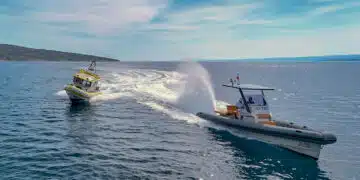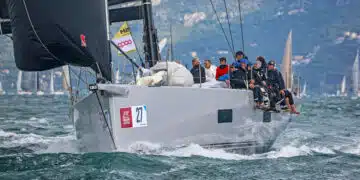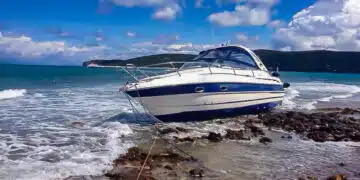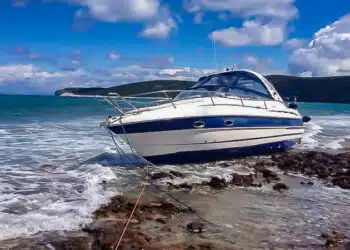While the fuel prices for gasoline and diesel at the fuel stations on roads and highways in Croatia are compared to the rest of Europe on a favorable and friendly level for vacationers, the skippers complain partly about “rip-off at the boat gas stations”, as it is literally called. The reason: Instead of normal diesel, overpriced premium diesel and premium gasoline are said to flow out of the pumps at the boat refueling stations. That makes in the extreme case a price difference of nearly 40 cent per liter. However, the situation in Croatia is not unique: Also in other European Destinationen one reaches partially at the boat gas stations strongly: The speech is from 20 to 30 cent higher prices than at the road gas stations.
Written and telephone inquiries with the mineral oil enterprises represented in Croatia such as INA or Petrol on the subject of prices and the quality of gasoline and diesel at Croatian gas stations remained unanswered despite multiple telephone inquiries on the matter, transparency vis-à-vis the consumer does not seem to be particularly important to these companies.
Fuel quality fits – the price not always
Worries about the quality of fuel are unfounded, however, rather currently skippers must probably worry about the planned vacation budget for fuel, if they do not inquire before refueling about the price per liter for gasoline and diesel at the boat refueling stations. This is difficult, however, because boat refueling stations often lack the price mast that is required at roadside refueling stations. And those who have waited for half an hour or more in front of the boat filling station, especially on Fridays when the charter boats come to refuel before being returned, often grudgingly accept the higher price.

That’s why rule number one: If possible, do not fill up on Friday, some resourceful gas station operators are even reported to increase the price of gasoline and diesel at boat refueling stations in Croatia especially on this day.
“Tank hygiene” decides
In this regard, the quality of the fuel leaving the large tank farms of oil companies in Croatia complies with the FQD, the European Fuel Quality Directive 98/70 EC , which specifies the exact fuel quality parameters to be complied with and to which all engine manufacturers tune their units. However, what then happens on the further way into the storage tanks of the respective service stations and later in the tanks of the respective boats and yachts is partly or completely beyond the influence of the mineral oil companies. Here, it is crucial how exactly service station operators or skippers take it with tank hygiene.
Different filling station models
Speaking of service stations: Similar to Germany or Austria, in Croatia a distinction is still sometimes made between service stations operated by the petroleum company under its own management and so-called owner-operated service stations, which do not differ in branding but give the owner significantly more rights, including with regard to pricing and the choice of fuel types.
Boat service stations: Premium diesel with B7 nonsensical
And this is where the problem begins at Croatian boat refueling stations: With the exception of INA, they are often owner-operated and have decided to offer expensive premium diesel and premium gasoline at some stations.
In general, the premium grades are not bad to begin with. Due to different EU regulations, for example, up to 7% biodiesel is added to normal diesel, which is indicated by the designation “B 7” within the fuel standard DIN EN 590 at gas stations should be recognizable. An increase to “B 10” is planned, i.e. with 10% biodiesel, also called FAME (Fatty Acid Methyl Ester) in specialist circles. In general, as described several times, the biodiesel content reduces aging stability and increases the tendency to bacterial growth (diesel plague). An increase to 10% can even lead to considerable engine-damaging oil dilution due to fuel ingress in some vehicles, especially passenger cars with complex exhaust gas cleaning systems.
No information on specifications of gasoline and diesel
The crucial question, however, is: How does the Croatian mineral industry hold up with premium diesel? Does it continue to blend up to 7% biodiesel and additive the fuel, or does it replace – as it does in most cases in Germany and Austria – the biodiesel content with high-quality paraffinic fuels according to DIN EN 15940 such as HVO (Hydrotreated Vegetable Oil) or GtL (Gas-to-Liquid, Shell)? Despite thorough research, there was no information about this on the Internet either, and queries were not answered at all.
High profit margins for premium products
Apparently for good reason: to produce premium diesel from “normal” diesel, there are two possibilities: Either the diesel is blended with paraffinic fuels, which is relatively cost-intensive, or the far cheaper route is chosen and appropriate additives are added to the diesel. The costs in additive production amount to about one to two cents to then blend premium diesel from conventional diesel and hardly justify the additional price of up to 40 cents per liter. Against this background, one might imagine why the mineral oil companies and service station operators are holding back on statements about fuel quality. Moreover, there is no known study showing any added value of premium B7-based diesel for boat engines.
The situation is similar for gasoline. At most, the premium effect is noticeable through the increased octane rating, which is prescribed for passenger car engines of some sports car manufacturers, but has virtually no effect on boat engines.
Additives: Self is the Skipper
If you really want to “play it safe,” use conventional gasoline or diesel for seasonal engines such as those on boats and yachts, and add an effective biocide-containing additive for diesel units, and a special additive for gasoline-powered engines, as manufacturers have in their range.
Fuel B7 diesel as premium pointless
Therefore, the following applies: premium fuel for boat engines is as good as senseless from a technical point of view, boat fuel stations that exclusively offer such fuels should be avoided until they think better of it.
For a worry-free refueling experience
How to protect yourself from possible irregularities at Croatian boat refueling stations? In general, according to many skippers, the current rule is that INA charges the same prices for gasoline and diesel at both road and boat fueling stations. Nevertheless, with INA as well as other suppliers, you should ask for the price before refueling if possible, unless it is obvious from the boat. And if necessary, use the SeaHelp Facebook page to post the respective prices at each boat fueling station accordingly.
Car drivers: no problem
By the way: Car drivers on the way to the vacation do not know these problems: gasoline costs in Croatia per liter about 1.46 euros, diesel about 1.36 euros and LPG about 1.03 euros at the road filling stations. And since fuel logistics, i.e. the route from the fuel depot to the filling station, has a rather insignificant influence on the price of fuel at the boat filling station pump, the prices at the boat filling stations should also correspond to the prices at road filling stations.
Current daily fuel price for Croatia at roadside gas stations by supplier
Sort (ascending or descending) the price by clicking on the fuel type.
| Marke | Benzin (€/L) | Diesel (€/L) | LPG (€/L) | Diesel+ (€/L) | A98+ (€/L) |
|---|---|---|---|---|---|
| Ina | 1.560 | 1.450 | 0.780 | 1.830 | 2.010 |
| Petrol | 1.560 | 1.450 | 0.770 | 1.860 | 2.010 |
| Shell | 1.560 | 1.460 | 0.760 | 1.900 | 2.020 |
| Crodux | 1.560 | 1.450 | 0.740 | 1.870 | 2.000 |
More posts about refueling & fuel
SeaHelp livestream:
Starting with a lecture on diesel plague.
Diesel pest especially a problem when staying in winter storage for long periods of time:
Neutral additive test sheds light on which additives work against diesel pest
Findings of tank cleaners in Croatia on problems with diesel:
Sailboats more affected by diesel pest than motor yachts
Preparing for winter storage:
Clean, empty and maintained
Tip from SeaHelp editors:
Proper Fueling at the Boat Gas Station













